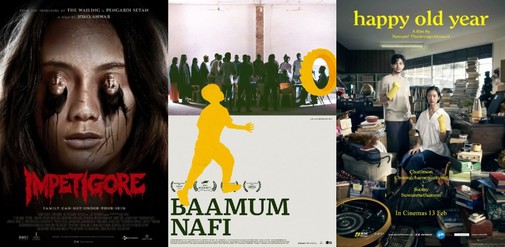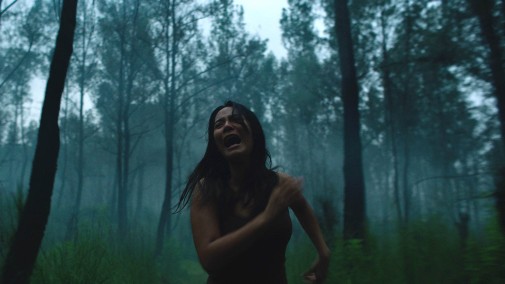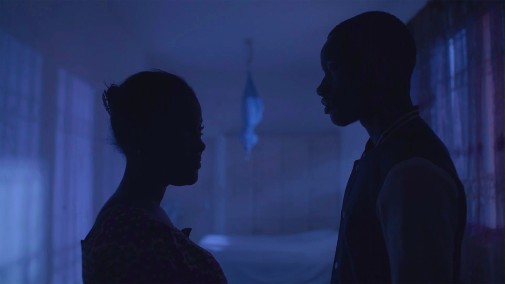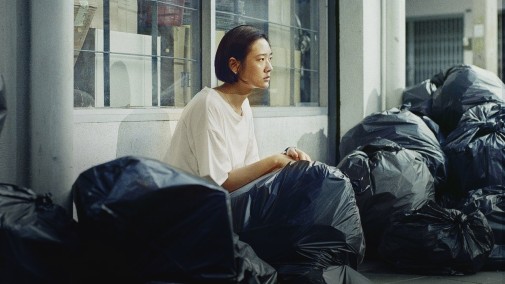
Tomorrow we'll know which 15 films made the Academy's shortlist in the Best International Feature Film category. In this series of capsule review trios, I've looked at 27 films whose quality spanned from shoddy propaganda to caustic masterpiece. To end in a round number, I'd like to shine a light on three films that are very unlikely to be chosen by AMPAS. Three features whose singular oddness and inspiringly weird ideas deserve to be celebrated, even though one of them can be called faultless. Join me, as I try to describe the wonders of an Indonesian horror flick with historical ambitions, a Senegalese tragedy with Shakespearean proportions, and a Thai coming-of-age tale centered on the ideologies inherent to minimalist interior design…

IMPETIGORE (Indonesia)
Are children responsible for their parents' crimes? Is it the present generation's duty to atone for the crimes of the past? At what point do we stop being accountable for the suffering upon which our privileges are built? Such questions are hard to answer, and rare is the film that dares make them, be it a hard-hitting exposé or a drama enshrined in Oscar-y prestige. As always, genre pictures have more liberty to explore difficult themes, approaching them obliquely. At first, Joko Anwar's Impetigore may look like any old horror movie, but there are profound depths to its nightmares. Following a young woman traveling from the city to the country in order to visit her family's old properties, the movie quickly shows us a hostile rural community, the threat of violence hanging in the air. However, the directions in which it takes that premise are excitingly complex, as are the registers its actors are willing to experiment. Somewhere between classicism and exploitation, the cast plays Grand Guignol as if it were Greek tragedy and happily eviscerate their characters before our eyes. It's a harrowing spectacle that culminates in an inspired climax, its story reaching the emotional echelons of opera, before disappointing with a needless coda. That fault notwithstanding, it's a fantastic and fantastically gory exercise in horror, full of memorable images and a couple of great performances. Jason already wrote about Marissa Anita's "Funny Best Friend", but I'd like to give special praise to Christine Hakim. That grande dame of Indonesian drama delivers a disquieting vision of maternal obsession curdling into a vengeful rage. She's frighteningly great! B

NAFI'S FATHER (Senegal)
In Mamadou Dia's feature debut, the conflict between two brothers grows like cancerous tissue spreading over their community. Tierno's on his way to becoming an imam and sees the religion as a conduit for peace, self-knowledge, and self-reflection. On the other hand, his older brother, Ousmane, regards it as a stepping stone to power and uses fundamentalism as a tool. When greed meets opportunistic fanaticism, tragedy is soon to follow. Dia's meandering narrative structure shows the gradual process by which the claws of fundamentalist Islam close over the brothers' village, tensions rising steadily but unnoticed until it's too late. It should be said that, despite its premise, Nafi's Father isn't a film that endorses moral binaries. None of the characters are without fault. Even Tierno, our honored protagonist, is painted with shades of hypocrisy due to the patriarchal behavior he shows towards his daughter, Nafi. It's around the young woman that the denouement of this portentous tale unfolds, when blood is spilled and tears are shed, long prayers sung to a God that doesn't answer back. There's a pageant-like formality to the fatalistic proceedings, a verve of theatricality that recalls the Bard's sorry stories of family dispute ended by death. That quality also transposes to the actors' performances and the design of the feature. Alassane Sy is remarkable as Tierno, embracing the tonal contrasts and contradictions with stoic aplomb, poetic showmanship. As for the costumes, Salimata Ndiaye's creations masterfully articulate the village's social evolution, the way religion can be a freeing miracle and a merciless chain, its transcending power and propensity for violence, its beauty, and its horror. B

HAPPY OLD YEAR (Thailand)
Back from studying abroad, Jean returns to Thailand like a cloud of resentment ready to strike with thunder anyone who comes too close. Despite her dark mood, she speaks with passion and opens the film with mellifluous words on the spirituality of minimalism, peace contained within its clean lines and empty rooms. It turns out that she wants to remodel her family's house and the adjoining shops where her father used to sell and fix musical instruments. Over the years, the place has been overrun by endless piles of objects, a mess so thick it's difficult to walk through it. Looking at the space, one might be prone to agree with Jean's will to KonMari the clutter away, but things start to become tricky once the apparent trash starts revealing secret stories and sentimental value. Director Nawapol Thamrongrattanarit has long been fascinated by the capacity of objects to retain memories, affective remembrances, the essence of humanity. In Happy Old Year, he avoids experimentalism, tackling said ideas through a more conventional narrative, tying his meditations to the evolution of his protagonist, her hang-ups, her shattered dreams, the pain of loss, the burden and necessity of selfishness. It's a more complicated tale than it might appear at first, and it's difficult not to feel like all the characters involved are right in some regard. Happy Old Year is a film full of generosity towards every person and every knick-knack, but while such quality is commendable, it also can get the picture in some trouble. Specifically, the flick's too long and unyieldingly repetitive. Still, gorgeously shot and even more impressively designed, this is a fascinating conundrum, a character study unlike anything I've seen. B
As said before, none of these titles seem particularly primed to hit it big with AMPAS. Maybe Happy Old Year will benefit from some more exposure thanks to its Netflix release, but that's it. Impetigore, being a horror movie with little to no pretensions of being "elevated", is almost surely out of the running. As for Nafi's Father, it seems like nobody's talking about it even if it's already time that Senegalese cinema gets some Oscar love. They've only been submitting since 2017 but their movie history is quite rich, just Ousmane Sembène's filmography would have made for a collection of just nominations and even a couple of victories.
Previously in this series:
- Chile, Mexico, South Korea
- Lesotho, Morocco, Sudan
- France, Portugal, Spain
- China, India, Japan
- Argentina, Canada, Russia
- Costa Rica, Peru, Uruguay
- Bosnia & Herzegovina, Ireland, Lithuania
- Iran, Jordan, Saudi Arabia
- Slovenia, Sweden, Ukraine